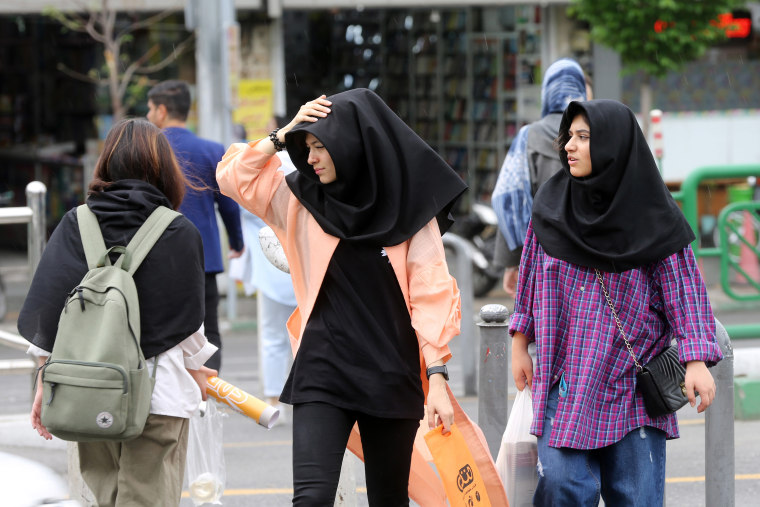Iran is trying to reimpose strict costume codes months after a wave of unrest following the loss of life of a younger girl who had been detained by morality police noticed girls and ladies take away their headscarves in protest.
The strikes got here as the federal government tries to reassert management after months of the typically violent nationwide demonstrations posed the most important problem to the clerical institution because the 1979 Islamic Revolution, which overthrew the U.S.-backed monarchy.
Over the weekend, 1000’s of textual content messages have been despatched to enterprise house owners and drivers, reminding them of the renewed crackdown on girls not carrying hijabs, the pinnacle coverings worn by some Muslim girls, in response to the Iranian state broadcaster IRIB Information.
Officers additionally introduced that individuals who encourage girls to take away their hijabs can be prosecuted.
“The crime of selling unveiling will probably be handled within the felony court docket whose selections are remaining and unappealable,” Deputy Lawyer Common Ali Jamadi stated Saturday, in response to the semiofficial Mehr Information Company.
The chief commander of Iran’s police forces, Ahmad-Reza Radan, lately introduced a set of procedures that got here into place Saturday.
Shops by which feminine workers don’t put on head coverings will first obtain a warning, and will face closure if the staff don’t comply, he added.
Following the loss of life of Mahsa Amini, a 22-year-old Kurdish Iranian, in a hospital Sept. 16 after being detained for allegedly breaking the legal guidelines governing costume, the hijab turned an emblem of official repression, with girls and ladies defiantly eradicating their headscarves in public.
The unrest has been largely quelled by drive and mass arrests, and the federal government had spent a number of months constructing as much as its renewed emphasis on girls’s costume codes.
Iranian President Ebrahim Raisi underlined the significance of the costume code, specifically the headband, in a current speech in Tehran.
The headband is a “religious necessity,” he stated, in response to a video posted on Twitter by the federal government’s public affairs workplace.
“Right now, the problem of hijab is a authorized matter, and all members of our society ought to adhere to the hijab, as they’ve been to date,” Raisi stated on the occasion April 1.
The renewed emphasis on the hijab was introduced April 8, with implementation starting over the weekend.
The plans have been met with criticism from some Iranian girls.
“This harsh and impolite response will certainly both make issues worse or won’t lead wherever,” Parinaz Mobarhan, a resident of Tehran, informed the West Asia Information Company in video distributed by Reuters.
“The hijab is a voluntary matter,” stated one other resident, Nasiri, who solely offered one identify. “The individual herself has to determine whether or not they wish to have this scarf round them or not. I feel forcing this may yield the alternative end result.”

The hijab has been compulsory for all girls in Iran because the early 1980’s Among the many most blatant guidelines governing the inhabitants’s habits have been these based mostly on the conservative institution’s interpretation of Islamic costume codes.
Morteza Aghatehrani, a hard-line member of the Iranian Parliament, stated that the hijab was “appointed by God,” and that it was an previous regulation that was in want of revision.
“The Parliament, authorities and judiciary are at present discussing this,” he informed NBC Information, including that it “wants critical adjustments so it could possibly be applied.”
Rima Abdelkader contributed.


